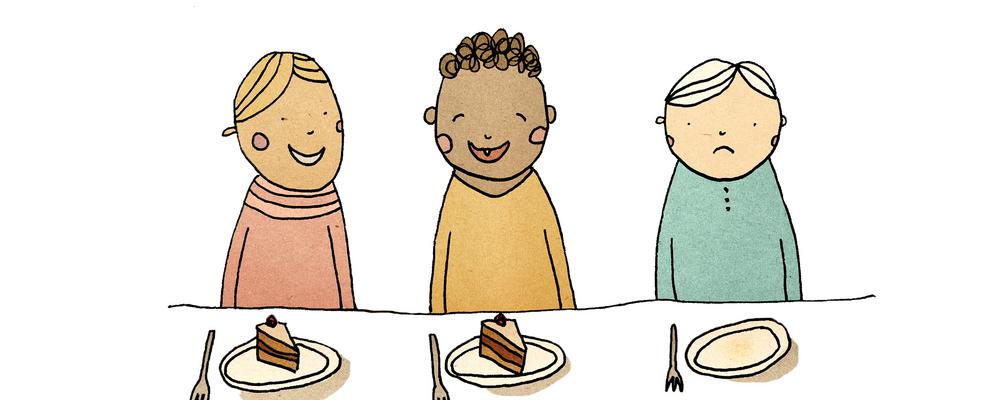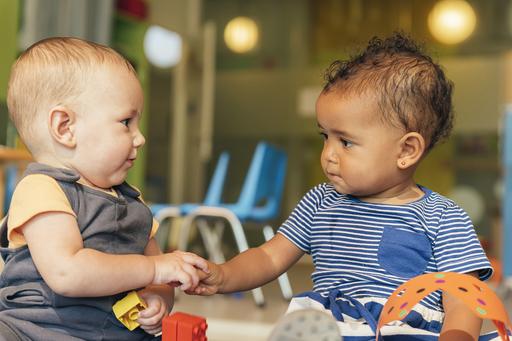
The Infant and Child Laboratory
We study the emergence and development of infants’ socio-moral skills and how these are mediated by caregivers’ assistance in communicative activities.
Gothenburg AMBLE, Infant and Child Laboratory (INCH)
We study the emergence and development of infants’ socio-moral skills and how these are mediated by caregivers’ assistance in communicative activities. Our research focuses on the following broad themes:
Do infants understand fairness?
Most people find it challenging to imagine a preverbal infant being concerned about what is right or wrong. Traditional developmental theories, supported by decades of research, consider it likewise as established knowledge that children’s behavior until school age is mainly guided by their self-interest. Yet, according to experimental research in recent years, infants demonstrate a host of prosocial behaviors such as helping, comforting, sharing, cooperating and informing. These findings suggest that humans learn to be concerned about others’ welfare earlier than previously thought.

Our work targets the emergence of one specific aspect of prosocial reasoning, that is distributive fairness. We have found that 10-month-old infants detect unfair distribution of resources and evaluate positively individuals who follow the principle of equality. Additionally, our research in non-Western context has revealed very early cultural differences in fairness expectations. These results highlight that notions of fairness originate from cultural values and social practices of different societies.
How do communicative interactions mediate the emergence of social reasoning?
One of the most essential aspects of a meaningful life and psychological well-being is being socially connected to other people. The foundation for social connectedness is social perspective-taking, that is our ability to understand our own and others’ inner experiences in terms of mental states such as intentions, emotions, knowledge and beliefs.
Our research examines how communicative experiences in infancy mediate the emergence of children's perspective-taking skills, and thus help them to connect with their social environments.

We have several projects where we study communicative activities and social perspective-taking skills among Western and non-Western infants. Previous research with Western samples has established that exposure to mental state conversations, that is talking about your feelings, emotions and thoughts, is essential for learning about social perspective-taking. Yet, our findings suggest that there are few direct infant-parent verbal interactions in general, and conversations about inner mental states in particular, in non-Western populations such as Samburu and Kikuyu in Kenya.
Furthermore, findings from our research with deaf children show that growing up in hearing families is associated with limited exposure to their caregivers’ talk about mental states and considerable delays in perspective-taking skills. These results confirm that the uniquely human social skills are co-constructed in verbal communication between infants and their caregivers.
Members
Full professors
Associate professors
PhD students

Eye tracking
Our lab is equipped with two eye tracker systems connected to large screens (Tobii). We have additionally two portable eye trackers that can be easily relocated to testing areas in different parts of the world for our cross-cultural studies. In our studies infants’ looking times and pupil sizes are measured in order to acquire data about their non-verbal reactions to social interaction in animated movie clips.
EEG
Our EEG lab is equipped with a Tobii Pro Spectrum eye tracker combined with a NeuroScan EEG system. The recording of ongoing electrical brain activity (EEG) is a neuroimaging technique that has been particularly popular in research with children because it is relatively easy to apply and noninvasive. Due to its high temporal resolution, this technique can provide detailed information about neurocognitive processes of cognitive activities while they occur.
fNIRS
We have accessibility to use the noninvasive optical imaging technique functional near infrared spectroscopy (fNIRS), in cooperation with Gothenburg AMBLE and MedTech West. It measures the relative change in oxygenated and deoxygenated hemoglobin a few centimeters into the brain. fNIRS is a very child friendly imaging technique due to its portability, robustness against motion artifacts and that the measurements are not effaced by anything in the surrounding environment.
Funding
2021-2023 SWEDISH RESEARCH COUNCIL FOR HEALTH, WORKING LIFE AND WELFARE: Possibilities and challenges of digital online learning for school children with hearing loss: lessons from three Nordic countries during the COVID-19 pandemic. PI: Marek Meristo
2018-2020 SWEDISH RESEARCH COUNCIL: On the origins of fairness: Infants’ expectations of distributive justice in traditional non-Western societies. PI: Marek Meristo
2014-2018 SWEDISH RESEARCH COUNCIL FOR HEALTH, WORKING LIFE AND WELFARE: On the origins of theory of mind – Conversational input and belief attribution in deaf/hard-of-hearing and hearing infants. PI: Marek Meristo
2015-2019 SWEDISH RESEARCH COUNCIL: Barns utveckling: samspelet mellan lärande, utveckling och hjärna i pedagogisk praktik. Co-I: Erland Hjelmquist
2014-2015 JAPAN SOCIETY FOR THE PROMOTION OF SCIENCE: Equality and equity principles in infants’ reasoning about fairness. PI: Marek Meristo
2011-2014 ERC MARIE CURIE PROGRAMME: Development of social cognition in infancy: Exploring the roots of spontaneous mentalizing abilities. PI: Marek Meristo
2012-2013 JERRINGFONDEN: Betydelsen av språk och samspel för social utveckling hos barn med grav hörselnedsättning. PI: Marek Meristo
Collaboration
- Institute of Child Development, University of Minnesota, Minneapolis, MN (External link)
- Doshisha University Center for Baby Science, Kyoto, Japan (External link)
- UCL Deafness Cognition and Language Research Centre, London, UK (External link)
- Department of Psychology, University of Michigan, Ann Arbor, MI (External link)
- University of Oulu, Faculty of Humanities (External link)
- NTNU, Department of Psychology (External link)